Spiranthes spiralis - Autumn Lady's Tresses
Phylum: Magnoliophyta - Class: Liliopsida - Order: Orchidales - Family: Orchidaceae
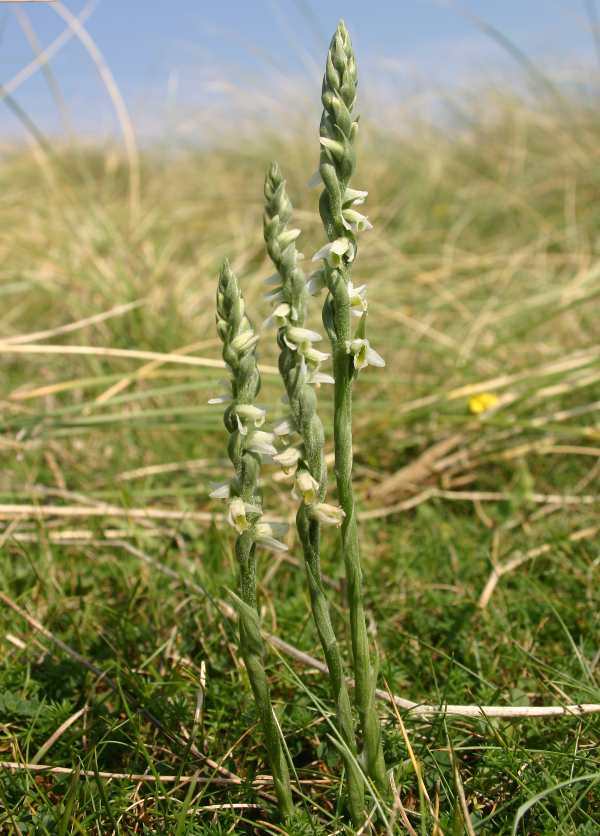
This perennial orchid is usually very small and can be quite difficult to spot amongst grass and other low-growing green vegetation unless its white flowers are fully open. Plants can occur in vast numbers one year and then virtually disappear for several years before reappearing, sometimes in even greater numbers than before.
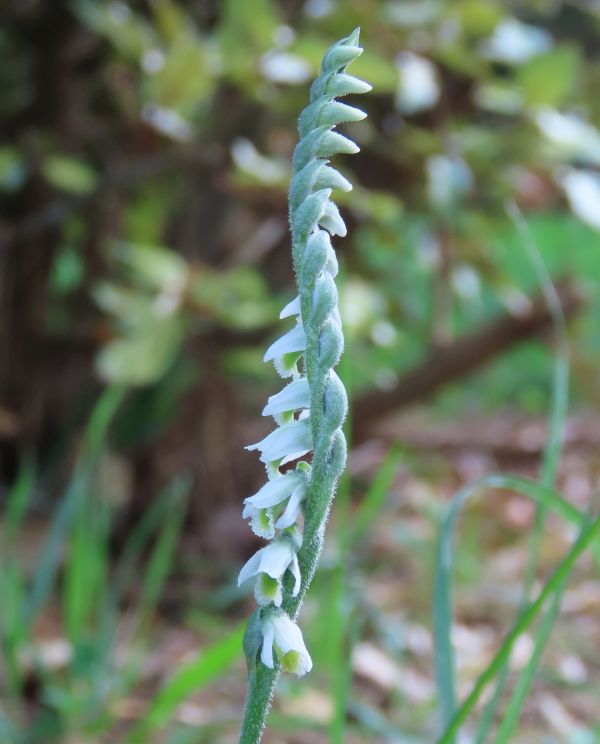
Description
Autumn Lady's Tresses plants usually grow up to about 20 cm tall, but in windswept sites they are often no more than 10cm in height and very easily overlooked. Plants in sheltered woodland edges sometimes grow to a height of 30cm.
Individual flowers, which are brilliant white with a green patch on the inside and outside of the lower tepal (the lip), are tubular or bell-like, 4 to 7mm long and typically 3 to 5mm in diameter. The way in which the flowers grow is a clue to the origin of the plant's Latin name, Spiranthes spiralis, since they form a spiral around the stem. Small plants may have as few as six flowers, but 12 to 24 flowers per stem is more typical. Polination is by insects, and in Europe various kinds of bees have been seen carrying pollen from this orchid species.
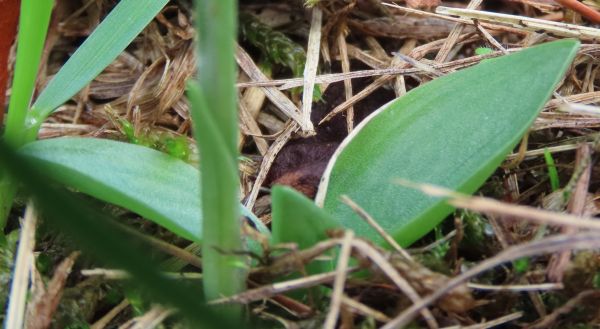
Flowering stems arise from the centre of previous year's dead leaf rosettes. Beside the stem, there is a new basal rosette of up to five pointed ovate blue-green leaves 2 to 3cm long, while other much smaller leaves cling to the hairy stems and look rather like scales. The basal rosettes remain green through the winter and the following spring, before turning black.
Distribution
Autumn Lady's-tresses is localised in Britain and Ireland. Some impressive colonies can be seen in many parts of southern England, and Autumn Lady's-tresses appear also in scatterd locations as far north as Yorkshire. Absent from Scotland, Spiranthes spiralis is found in Wales and in southern Ireland, particularly in coastal locations in the south and west.
Widespread thoughout most of mainland Europe except for northern Scandinavia, this species is also known to occur in parts of North Africa. To the east, the range of this orchid extends through Turkey and Iran and into parts of the central Himalayas.
Spiranthes spiralis is not native to North America, where several other Spiranthes species occur including Irish Lady's-tresses Spiranthes romanzoffiana, which is most commonly referred to in the USA as Hooded Lady's-tresses.
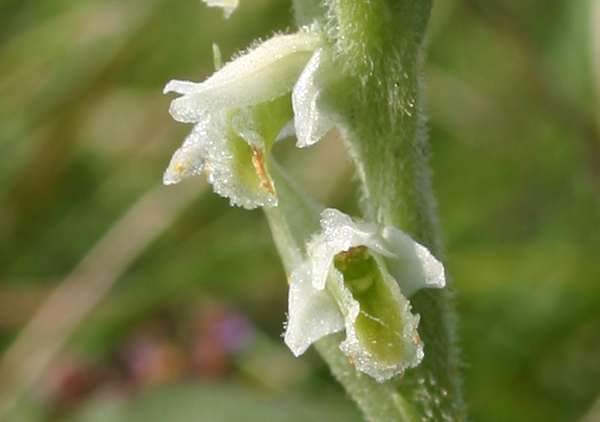
Habitat
This orchid of calcareous (limestone or chalk) substrates favours low-altitude closely-cropped grassland. Autumn Lady's-tresses often grows on coastal flat-topped cliffs and stable vegetated dunes; but it also appears on short-cut lawns, mainly on the coast but also occasionally inland and sometimes in impressively large numbers. As with all terrestrial wild orchids, colonies soon disappear if the land is treated with, or subject to runoff by, enriching fertilisers or selective weedkillers.
Flowering time
This is a late-flowering orchid. The specimens pictured on this page were found in early August at Sker Point, near Kenfig Nature Reserve in South Wales, and in southern France during September. We have also seen and photographed this orchid in The Burren in County Clare, Ireland; at Ynyslas Dunes, mid Wales; and on Great Orme, North Wales, in late August and early September. In the Algarve, Spiranthes spiralis flowers even later - typically in November but very much dependent on when the first end-of-summer rain comes.
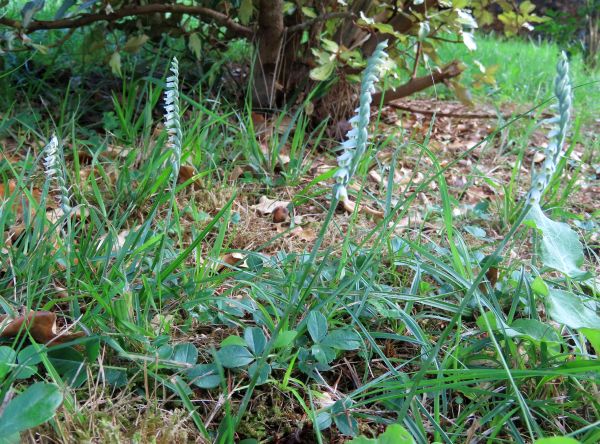
Etymology
The genus name Spiranthes means 'spirally-arranged flowers'. The specific epithet spiralis again refers to the spiral arrangement of flowers up the stem.
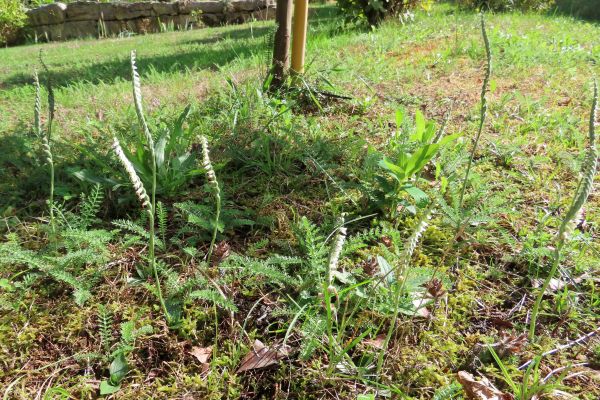
Reference sources
Sue Parker (2023) Wild Orchids of Wales - how, when and where to find them; First Nature e-book (Amazon Kindle format)
Sue Parker (2023) Wild Orchids of the Algarve - where, when and how to find them; First Nature e-book (Amazon Kindle format)
Chris Thorogood and Simon Hiscock (2014) Field Guide to the Wildflowers of the Algarve; Kew Publishing
Anne and Simon Harrap (2005) Orchids of Britain and Ireland; A&C Black
Pierre Delforge (2005) Orchids of Europe, North Africa and the Middle East; A&C Black
Please Help Us: If you have found this information interesting and useful, please consider helping to keep First Nature online by making a small donation towards the web hosting and internet costs.
Any donations over and above the essential running costs will help support the conservation work of Plantlife, the Rivers Trust and charitable botanic gardens - as do author royalties and publisher proceeds from books by Pat and Sue.


